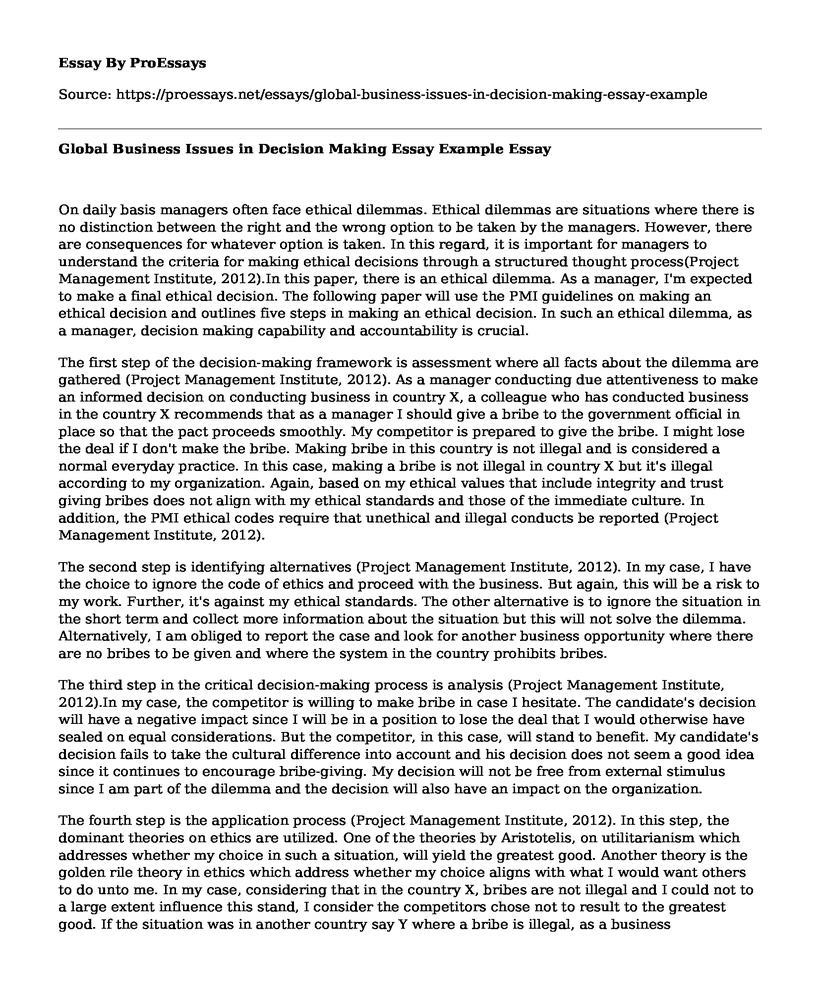On daily basis managers often face ethical dilemmas. Ethical dilemmas are situations where there is no distinction between the right and the wrong option to be taken by the managers. However, there are consequences for whatever option is taken. In this regard, it is important for managers to understand the criteria for making ethical decisions through a structured thought process(Project Management Institute, 2012).In this paper, there is an ethical dilemma. As a manager, I'm expected to make a final ethical decision. The following paper will use the PMI guidelines on making an ethical decision and outlines five steps in making an ethical decision. In such an ethical dilemma, as a manager, decision making capability and accountability is crucial.
The first step of the decision-making framework is assessment where all facts about the dilemma are gathered (Project Management Institute, 2012). As a manager conducting due attentiveness to make an informed decision on conducting business in country X, a colleague who has conducted business in the country X recommends that as a manager I should give a bribe to the government official in place so that the pact proceeds smoothly. My competitor is prepared to give the bribe. I might lose the deal if I don't make the bribe. Making bribe in this country is not illegal and is considered a normal everyday practice. In this case, making a bribe is not illegal in country X but it's illegal according to my organization. Again, based on my ethical values that include integrity and trust giving bribes does not align with my ethical standards and those of the immediate culture. In addition, the PMI ethical codes require that unethical and illegal conducts be reported (Project Management Institute, 2012).
The second step is identifying alternatives (Project Management Institute, 2012). In my case, I have the choice to ignore the code of ethics and proceed with the business. But again, this will be a risk to my work. Further, it's against my ethical standards. The other alternative is to ignore the situation in the short term and collect more information about the situation but this will not solve the dilemma. Alternatively, I am obliged to report the case and look for another business opportunity where there are no bribes to be given and where the system in the country prohibits bribes.
The third step in the critical decision-making process is analysis (Project Management Institute, 2012).In my case, the competitor is willing to make bribe in case I hesitate. The candidate's decision will have a negative impact since I will be in a position to lose the deal that I would otherwise have sealed on equal considerations. But the competitor, in this case, will stand to benefit. My candidate's decision fails to take the cultural difference into account and his decision does not seem a good idea since it continues to encourage bribe-giving. My decision will not be free from external stimulus since I am part of the dilemma and the decision will also have an impact on the organization.
The fourth step is the application process (Project Management Institute, 2012). In this step, the dominant theories on ethics are utilized. One of the theories by Aristotelis, on utilitarianism which addresses whether my choice in such a situation, will yield the greatest good. Another theory is the golden rile theory in ethics which address whether my choice aligns with what I would want others to do unto me. In my case, considering that in the country X, bribes are not illegal and I could not to a large extent influence this stand, I consider the competitors chose not to result to the greatest good. If the situation was in another country say Y where a bribe is illegal, as a business representative or manager the competitor would also like to be treated on a fairground in winning the business deal. Therefore the decision is affected by the community in which the practice takes place.
The final fifth step is the action process (Project Management Institute, 2012). In this step, I am bound to make the decision on the grounds of whether I will be willing to take responsibility for my decision. In addition, the challenge in this process is whether I would be willing to put the decision on the public domain and whether I would be proud of it. This step is therefore crucial and consequential. I evaluate the impact of the decision on emotional professional and social context. Taking a position to give bribe would be beneficial in getting the deal done but again it's against my organizational policy and against my professional image as the manager. If I gave the bribe, I would taint my organizations brand name negatively. In this case, the ethical evaluation process results in not giving a bribe as its unethical both for my organization and against the PMI guidelines. As such I choose to report the case to the PMI and choose not to give the bribe.
References
Project Management Institute. (2012). PMI ethical decision-making framework. Retrieved from http://www.pmi.org/About-Us/Ethics/~/media/PDF/Ethics/Ethical%20Decision%20Making%20Framework%20-%20FINAL.ashx
Cite this page
Global Business Issues in Decision Making Essay Example. (2022, Aug 23). Retrieved from https://proessays.net/essays/global-business-issues-in-decision-making-essay-example
If you are the original author of this essay and no longer wish to have it published on the ProEssays website, please click below to request its removal:
- Essay Sample on Women and Employment
- Mental Health and Stigma Essay
- Management and Leadership Responsibilities Within Early Childhood Educational Paper Example
- Research Paper: Devising a Network Management Plan and Security Plan for HandMade Furniture Ltd
- Essay Sample on Poverty Impeding Women's Empowerment & Impacting Gender Roles
- Essay Sample on Rethinking Foster Care: Examining Challenges at the Micro-Level
- Essay on Second-Parent Adoption: Securing the Future of Same-Sex Couple's Kids







